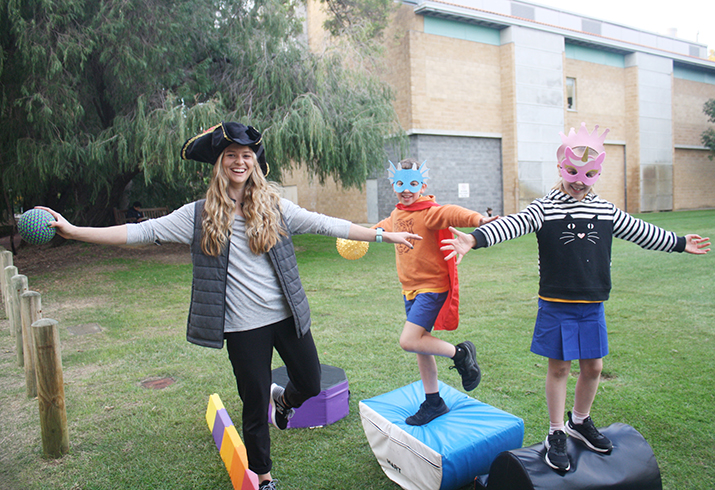Fit for Play wins fans and boosts confidence for Pathways participants

A pressure-free physical activity-based program that develops fitness, movement and social skills via such engaging activities as juggling and pirate and spaceship adventure play has been shown to boost confidence in children with mental health disorders and motivate them to lead more active lives.
The Fit for Play program – based on the ‘exercise is medicine’ concept - was established by exercise physiologist Kat Fortnum, in collaboration with the University of Western Australia (School of Human Sciences) and Pathways, a specialised Child and Adolescent Mental Health Service (CAMHS) program, as part of her PhD project in 2019.
Ms Fortnum set out to cater for the physical activity-based needs of primary-school-aged children with disorders including Post Traumatic Stress Disorder, severe anxiety and Attention deficit hyperactivity disorder (ADHD).
Following a six month intervention period with 23 children aged 6 to 12-years-old, research has shown that Fit for Play helped provide the first positive physical active experience for many of the participants.
As a result of the findings, it will remain part of the treatment model at Pathways, a trauma-informed state-wide service delivered by a multidisciplinary team of specialist mental health clinicians that provides educational and therapeutic services for children with complex and longstanding mental health issues and their families.
The move has also seen the inclusion of an exercise physiologist within a multidisciplinary CAMHS team for the first time.
Ms Fortnum said one of the big drivers of this research was knowing the more active you are is often linked to better outcomes from a mental health perspective.
"When we spoke with parents, they were very much on board with the concept of the value of physical activity, but they were unsure about how to engage their child.
"Physical activity at school and community sports tends to suit a child that is well functioning and able to follow the rules easily but what has been lacking is options for kids who need that little bit of extra support and flexibility,” said Ms Fortnum.
Children reported improvements in their confidence, social skills, and sports-specific movement skills.
Feedback from parents and carers who were involved with the study was overwhelmingly positive with many reporting their child was now more willing to give community and school sports "a go".
"Parents also described feeling empowered to provide opportunities for their child to be active, including home-based and low-cost options," said Ms Fortnum.
Pathways staff reported that Fit for Play assisted children to remain emotionally regulated, enabling them to access Pathways therapies, and it allowed them to practice social, emotional regulation, and sportsperson skills in a physical activity-context.
The program was also supported by Perth Children’s Hospital Foundation and be giving who funded specialised gym equipment to enable the research.
Perth Children’s Hospital Foundation CEO Carrick Robinson says this holistic approach to care is helping WA children to get well and stay well.
"We are proud to fund the equipment for the Fit for Play program to increase engagement in physical activity and support the recovery from mental illness.
"This is an exemplary example of how a holistic approach to care can promote both physical and mental health outcomes for WA children," said Mr Robinson
To find out more about the program. email CAMHS.ResearchHub@health.wa.gov.au.

